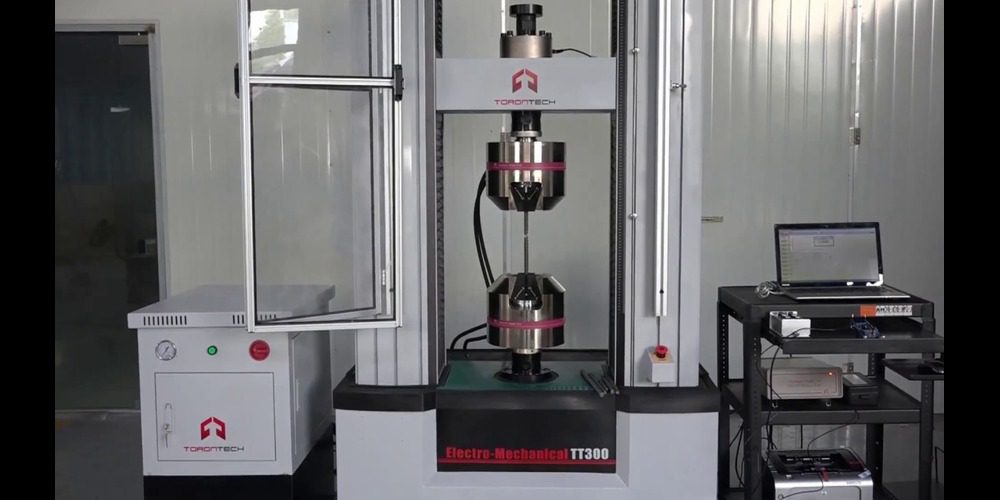Real-World Applications: The Benefits of UTMs in Metal Testing

A universal testing machine (UTM) is an advanced test device designed for determining the mechanical properties of materials under different conditions. These machines are primarily used in material testing to determine characteristics such as elasticity, ductility, yield strength, and tensile strength, as well as tensile, compression, bend, and shear tests. With controlled stress and strain, UTMs identify how a material will behave under different forces, making them valuable for quality control and research and development.
Technology and manufacturing advancements have made UTMs more affordable and accessible in recent years, democratizing high-quality material testing. The shift has underscored the importance of integrating advanced UTMs into quality assurance protocols. Whether in aerospace, automotive manufacturing, construction, or medical devices, UTMs are essential to guarantee safe, durable, and innovative products. As businesses recognize the direct link between rigorous testing, product excellence, and market competitiveness, this trend reflects a broader industry trend to prioritize material integrity.
Harnessing Universal Testing Machines Across Industries
It is impossible to overstate the importance of Universal Testing Machines in ensuring material quality and integrity. UTMs are being used widely in many industries, proving that they are not just tools but foundational elements in the pursuit of innovation, safety, and sustainability. Let’s explore the value of UTMs across different industries, highlighting their unique contributions to each.
Aerospace and Aviation
A reliable material is crucial to the aerospace and aviation industries. Metals and composites used in aircraft structures and components are tested with UTMs. From fuselage panels to engine components, these materials are rigorously tested for strength, compression, and fatigue. As a result of providing material reliability, UTMs are essential in the aerospace industry because they contribute to safety, performance, and long-term durability.
Automotive Manufacturing
In the automotive industry, UTMs are used to test and improve materials used in vehicle production. Under simulated conditions that mimic real-world stresses, UTMs assess the properties of steel in car frames and polymers in interiors. The purpose of this testing is to develop lighter, safer, and more durable vehicles that meet consumer expectations and meet stringent safety standards. Because of this, UTMs are at the forefront of innovations in vehicle design and materials science, driving the industry forward.
Construction and Civil Engineering
UTMs are essential in the construction and civil engineering industries for testing the strength and flexibility of building materials such as steel, concrete, and composites. During these tests, materials are tested to ensure they can support the weight and stress of structures such as bridges, skyscrapers, and tunnels. Data from UTM tests inform critical decisions in construction projects, from material selection to structural design, emphasizing the machine’s importance.
Medical Devices and Equipment
Medical device manufacturers use UTMs to test biomaterials and components used in medical equipment and implants for durability and performance. The tests verify that products comply with regulations and are safe for human use. Tests using UTMs guide the design and development of life-saving medical technologies, whether they examine a surgical suture’s tensile strength or an implantable device’s flexibility.
Maximizing Product Quality with Universal Testing Machines
UTMs transcend industry boundaries, proving to be a valuable asset for businesses of all sizes. These machines offer a comprehensive solution to verifying materials’ quality and durability, resulting in products that exceed market expectations. Businesses can significantly improve the reliability and safety of their products by incorporating UTMs into their quality assurance processes, regardless of their industry niche.
Consider, for instance, a chair manufacturing company. A chair’s structural integrity is crucial since it must withstand daily stresses and loads. Using tensile testing UTM, the business can accurately assess materials’ mechanical properties before production begins. Identifying the best materials that can withstand the expected stresses and strains guarantees that the chairs won’t fail under weight or over time. In this way, preemptive testing confirms that the chosen materials will produce durable, safe chairs, thereby minimizing recall risks.
Furthermore, UTMs go beyond ensuring product safety in testing. Innovation and product development depend on it as well. Understanding the limits and capabilities of different materials allows businesses to develop cutting-edge designs and technologies that are reliable, innovative, and aesthetically pleasing.
UTMs are a strategic investment that pays dividends in customer satisfaction and brand reputation. In a competitive market, it is a sign of commitment to quality. Small and large businesses use UTMs not just for testing, but as a tool for trust, quality, and innovation.
The Indispensability of Universal Testing Machines in Modern Industries
UTMs have emerged as fundamental tools for assessing the properties of materials and have become the cornerstone of product development and quality assurance across a variety of industries. From aerospace components to medical devices, UTMs play an increasingly critical role in ensuring durability, safety, and innovation. Testing UTMs provides insight into material behavior under diverse conditions by facilitating detailed examinations of elasticity, ductility, yield strength, and tensile strength.
Due to technological advancements, UTMs have democratized material testing, making it a standard practice in quality assurance protocols across the globe. Aerospace, automotive, construction, and medical devices industries have implemented UTMs into their processes to comply with stringent safety standards as well as push the boundaries of what is technically possible. The shift towards rigorous material testing reflects a broader understanding of the link between product excellence and material integrity.
Furthermore, UTMs are becoming increasingly popular in businesses of all sizes because of their universal applicability to improving product quality. As a result of this proactive approach to quality control, UTMs are not just testing instruments, but pivotal elements in innovation and building trust.
For businesses looking to leverage Universal Testing Machines effectively, selecting reputable manufacturers becomes paramount. In addition to providing a high-quality testing machine, a reliable company will also provide comprehensive support, including equipment setup and maintenance. Moreover, expert guidance and support can enhance the accuracy and efficiency of test results.
Read More From Techbullion




